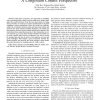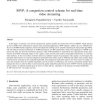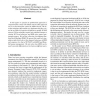74 search results - page 10 / 15 » Explicit rate multicast congestion control |
JCP
2007
13 years 7 months ago
2007
— This paper proposes a new approach to modelling and controlling Internet end-to-end loss behaviours. Rather than select the model structure from the loss observations as being ...
CN
2007
13 years 7 months ago
2007
In this paper, we present a new end-to-end protocol, namely Scalable Streaming Video Protocol (SSVP), which operates on top of UDP and is optimized for unicast video streaming app...
INFOCOM
1998
IEEE
13 years 11 months ago
1998
IEEE
We study the performance of TCP in an internetwork consisting of both rate-controlled and non-rate-controlled segments. A commonexample of such an environment occurs when the end ...
QOFIS
2000
Springer
13 years 11 months ago
2000
Springer
In this paper we present an optimisation approach to congestion flow control. The initial context of this approach was as a rate based flow control in ATM networks. We describe te...
CCR
2004
13 years 7 months ago
2004
Current congestion control algorithms treat packet loss as an indication of network congestion, under the assumption that most losses are caused by router queues overflowing. In r...



